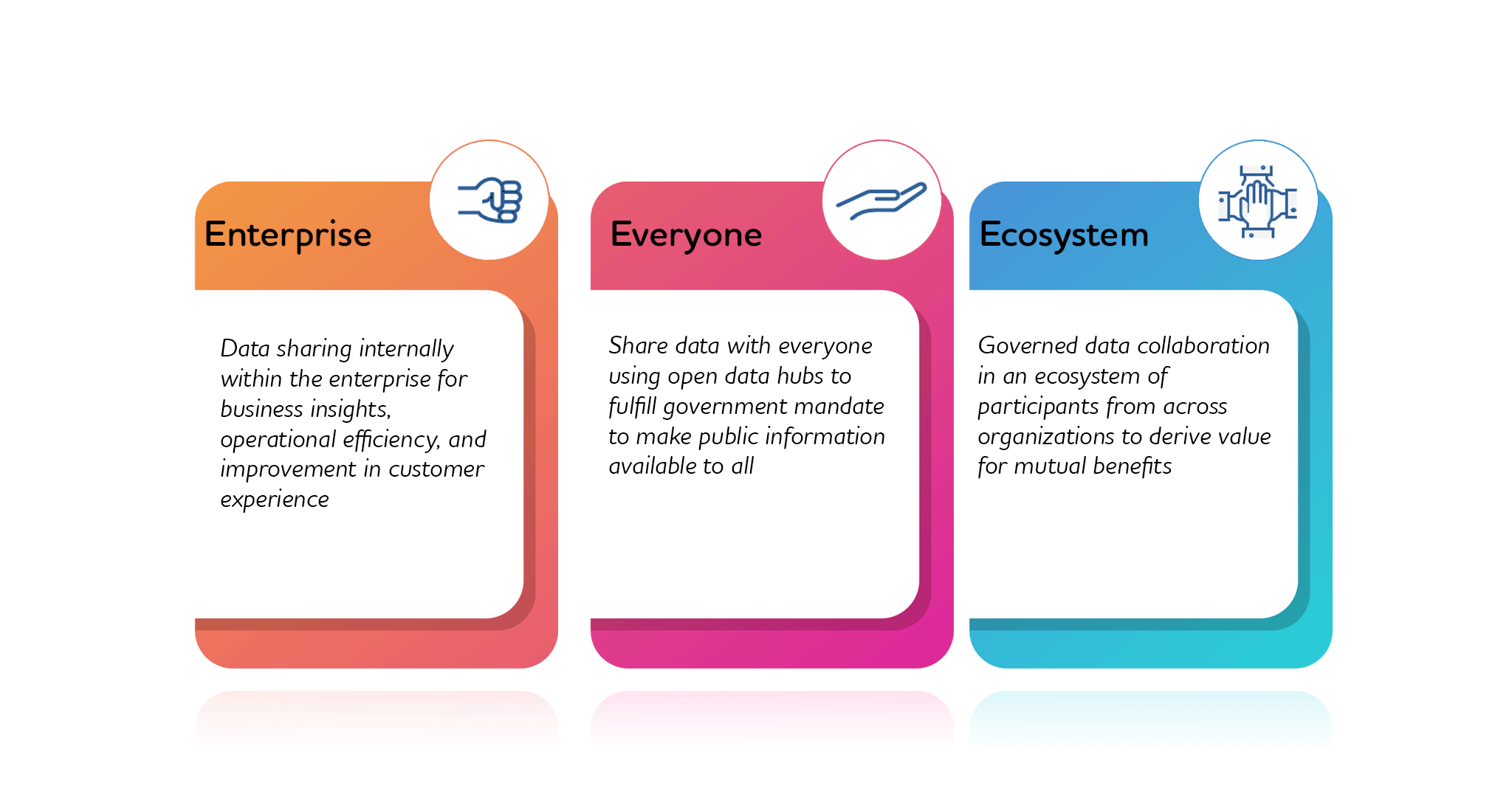Industries
HIGHLIGHTS
- Connected, collaborative, and automated mobility of future will be dependent on data to realize its full potential.
- Mobility ecosystem stakeholders must look at ‘data as an opportunity’ and must collaborate to offer smart, seamless, safe, and sustainable services.
- Mobility data will need to travel beyond enterprise boundaries through data exchanges that are as open as possible and as closed as necessary.
- Data spaces fill the void that exists for sovereign, secure, seamless, and scalable exchange of mobility ecosystem data
On this page
A system of data sharing for mobility
Cooperative, connected, and automated-these key themes will shape the future of smart mobility.
Cooperative Intelligent Transport Systems (C-ITS) will enable communication and co-operation between vehicles, infrastructure, and other road users for safer and efficient journeys. Mobility as a service (MaaS) will boost collaboration among multi-modal mobility operators to offer combined and frictionless transport services. This highly connected, automated, electric, and shared mobility ecosystem will be deeply intertwined with adjacent sectors such as energy, smart city, hospitality, insurance, and communication, and resulting in new innovations and business models in these sectors.
The stakeholders in the mobility ecosystem will need to share information with each other and use it to coordinate their actions for enabling smart, seamless, safe, and sustainable mobility and allied services to meet increasing user expectations and address challenges of urbanization and decarbonization. Ecosystem players will need capabilities for data collaboration. This will require a secure, sovereign, trusted, and interoperable system of data sharing that is ‘as open as possible and as closed as necessary’ for all participants to realize the full value of ecosystem data.
The concept of data spaces will facilitate data collaboration across mobility ecosystem actors to help realize the full potential of connected, collaborative, and automated mobility of future.
Future mobility ecosystem
The mobility ecosystem is going through rapid technological advancements.
The adoption of connected on-the-move devices and systems is resulting in large volumes of continuous, coordinate-aware, and contextual multi-dimensional data. This data is of immense value for ecosystem actors like vehicle manufacturers, suppliers, authorities, operators, and commuters. They can leverage the data in their value chain to increase interoperability, draw inferences, improve efficiency and influence travelers towards more safe, active, and sustainable transport choices1 and innovate new services. For instance,
EU’s Data for Road Safety initiative aims to create a safety related traffic information (SRTI) ecosystem that helps automobile manufacturers, infrastructure managers, public authorities, and operators exchange situational road traffic information like slippery roads, accidents and obstacles to identify safety-critical situations quickly and alert operations and other road users.
The MaaS Alliance advocates the establishment of an ecosystem that supports the development of frictionless, fair, trusted, governed and incentivized data-sharing models for participants for integration of multi-modal mobility services.
Rail Delivery Group (RDG) has built Rail Data Marketplace for the rail industry, app developers, tech firms, and academia to enable creation of innovative solutions in the rail sector and interconnected travel network.
The evolution of mobility will also influence adjacent ecosystems like tourism, hospitality, energy, insurance, entertainment, and retail. Travel will become a composition of services from this adjacent ecosystem. This will require these sectors to revisit how they stay connected with on-the-move customers, transform their services to be more relevant as per customer’s context and coordinates, and innovate new services. The meshing of connected vehicles’ data with these allied sectors will result in the emergence of new business models and services across these sectors.
All these trends show that data is a key asset, and an enabler and ecosystem data collaboration is the common key theme for realization of all these initiatives aimed at improving and transforming travel, deriving greater value for enterprises, and supporting authorities’ efforts for seamless, safer and sustainable mobility.
Mobility data, a strategic resource
Mobility ecosystem data will be a strategic resource to enable seamless, reliable, safe, and sustainable transport choices and allied services for travelers.
Public transport authorities and operators need to evolve into data-enabled businesses. In the future mobility ecosystem, industry players like transport authorities and operators, automobile manufacturers, cities, travelers, and other allied businesses will need effective means of collaboration to use each other’s data. Value chains driven by ecosystem data are expected to revolutionize the mobility sector by improving products, operations, and services, and enabling the development of new innovative solutions for generating societal and economic value for all stakeholders.
This will need a paradigm shift in how these organizations participate in the mobility ecosystem and share their data. The ecosystem stakeholder must shift from a ‘don’t-share-data-unless’ model to a ‘must-share-data-unless’ model to promote a data-sharing culture instead of a data-ownership culture. This culture should promote ‘data-as-an-opportunity’ mindset for continuous improvement and value creation at a scale that is not possible with an organization’s data alone. This cultural shift can enable organizations to outperform counterparts who do not share their data externally with their partners. Willingness to share data externally with partners will provide organizations with a competitive edge over non-sharing counterparts. Not sharing data may compromise the digital business transformation initiative of organizations.
However, organizations have inherent concerns due to perceived risks and challenges over privacy, competitive advantages, differentiation value of their data, loss of ownership, misuse, cybersecurity, and interoperability. The conflict that organizations are grappling with is whether to safeguard data as an asset or exchange data in a digital economy for ecosystem benefits. The cultural shift to address these challenges and concerns of the stakeholders will be possible only by establishing sovereign, secure, and trusted data collaboration as a core capability.
Ecosystem data collaboration
Traffic and transit organizations are embarking on digital transformation to reap the benefits of a connected and cooperative ecosystem of the future.
These mobility ecosystem players are reinvigorating their data storage, processing, analytics, and collaboration capabilities to handle the deluge of data expected from connected vehicles and infrastructure and derive value from it. Their levels of data collaboration can be categorized as (see Figure 1):
This involves data collaboration within the enterprise to address internal requirements.
Organizations are implementing centralized data platforms (date lakes, lake houses, warehouses) for storage, processing, analytics, and making data available for internal teams to develop data products. The governance of these platforms focuses majorly on internal usage of the data products for business insights and for improvements in operational efficiency and customer experience.
Organizations will have to open data to everyone to comply with government mandates for sharing public information to improve public services and policymaking.
Open data hub initiatives like European Union’s (EU) National Access Points (NAPs) enable access, exchange, and reuse of transport-related data to support EU-wide interoperable travel and traffic services.
Governed collaboration in an ecosystem of multiple organizations for mutual benefits will characterize data at this level.
In a mobility ecosystem, data will be distributed to multiple public and private stakeholders. This data will have varying degrees of openness, sensitivity, protection needs, or commercial value. Collaboration for data in a dispersed, cross-organizational ecosystem will require data sovereignty, ie, self-determined control of data use by the data producer. This will require capabilities to establish trust amongst participants from across organizations and governance to set up ownership, access and usage rights, and contractual arrangement between data producers and consumers.
Organizations are currently building data collaboration capabilities which are more focused to address ‘Enterprise’ and ‘Everyone’ levels of data collaboration. They need to gear up to address the future mobility’s ‘Ecosystem’ level collaboration needs, where data exchange between multiple organizations, industries, and authorities will be essential.
Data spaces for mobility ecosystem
A framework for cross-sector ecosystem data collaboration
A cross-sector ecosystem-level data collaboration capability will require a well-defined framework to manage and govern data resources and provide services for sovereign, seamless, trusted, secure, and scalable exchange of data.
The concept of data space is intended to address these requirements. Data space is a cross-sector data collaboration ecosystem that provides an interoperable framework, based on common governance principles, standards, enabling services, reference architecture, and technical components to address the following unique challenges of ecosystem-level data collaboration:
- Data sovereignty and trust: Organizations keep autonomy and control of their data assets, specifying who can access it, and the right to self-determination like with whom, how, and when to share data, for what purpose, and under what conditions by enforcing identity and access management and usage policies and establish trust through verifiable credentials of producers and consumers
- Seamless data exchange: Fostering technical and semantic interoperability by adopting data model and data exchange standards. For example, DATEX2 for traffic; INSIPRE for Infrastructure for Spatial Information; Transmodel, NeTEx, SIRI and GTFS for Transit Network and Service information
- Value realization: Ensuring fair monetization and benefit sharing among stakeholders taking part in data collaboration
Data spaces architecture envisions a scalable federated system for data sharing with decentralized data in an ecosystem expanding with new participants, increasing data volumes, and new use cases. They enable:
- Decentralization of data as data is stored at the source ie provider’s infrastructure, and providers retain control over their data and usage. Exchange of data happens directly between the participants.
- Federation of services, which helps participants join the data space and facilitate publishing, search, and exchange data. This includes services like registry, usage policy setup, cataloguing, observability, marketplace, and value creation.
Data space is not merely a technical endeavor. Its adoption demands a balance between competition and collaboration with emphasis on engaging ecosystem stakeholders to:
- Define a business model with shared goals and mutual benefits with clear value propositions and incentives for collaboration
- Shared responsibility for development of a governance framework and adoption of standards
- Data space has the potential to revolutionize the mobility ecosystem by breaking down silos and unlocking the power of collaboration.
A strategic need for smart solutions
Mobility is at the cusp of transformation with data being the driver and data collaboration becoming essential to realize its full potential.
Data spaces will enable the exchange of data in this cross-organization, cross-sector ecosystem to address concerns of data sovereignty, interoperability, and trust. Organizations must approach the conceptualization of data space with a clear vision of a market business model, its value chain, and business opportunities, besides the technical approach and governance framework. This will stimulate participation and spur investments for the design, development, and operation of data spaces. Embracing data spaces is not merely an operational decision for cross-sector, sovereign, secure, seamless, and scalable data-sharing, but a strategic imperative to evolve and innovate solutions for smarter, integrated, and sustainable mobility ecosystem of tomorrow.

